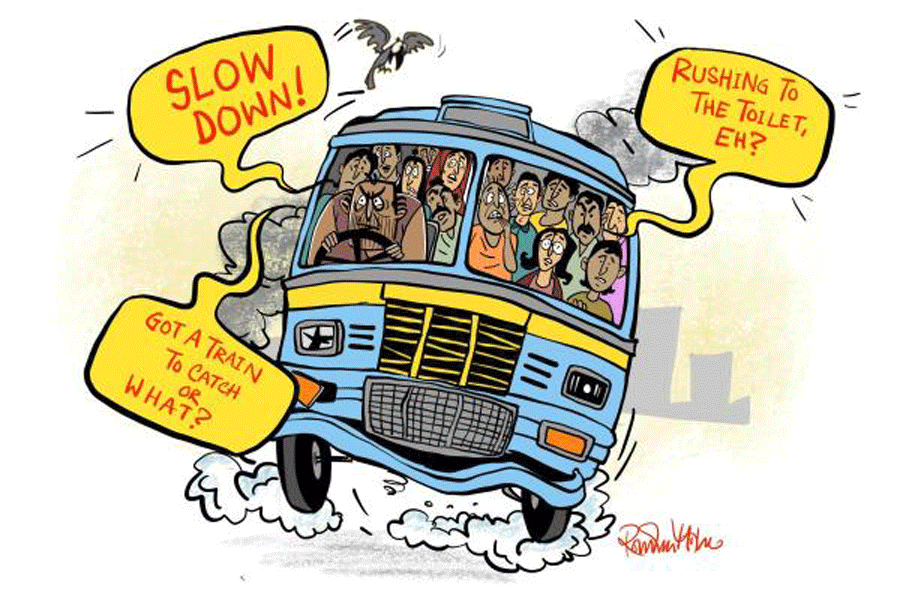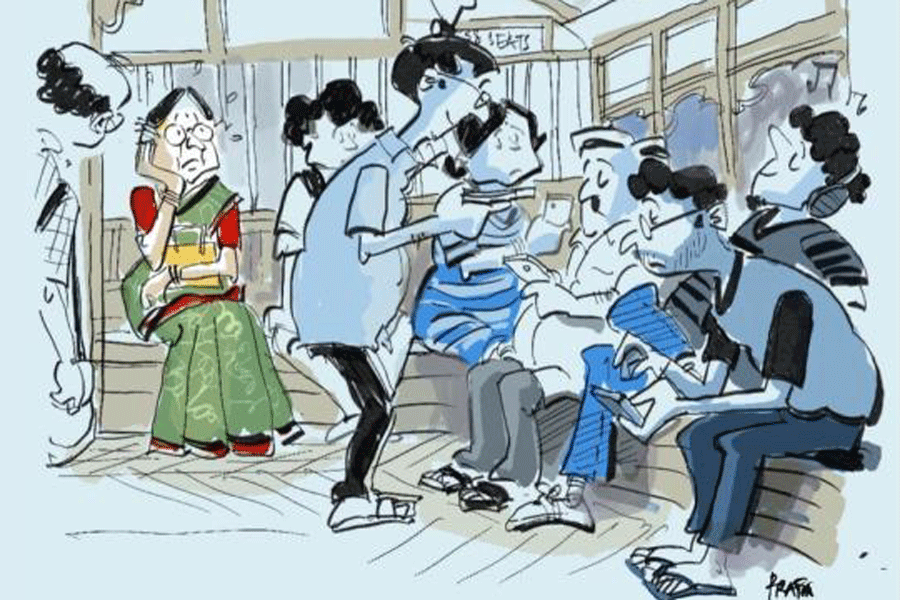What do you do if a stranger on a bus looks at you and expresses dismay at the World Cup defeat? Do you pour out your theory on where Team India went wrong? Do you look away, wondering why the man’s trying to be over-friendly? Or would his attempt at making conversation fall on deaf ears anyway as you always keep your headphones on while traveling?
The art of making small talk with co-passengers is fast fading and it’s impacting our mental health. This is the observation of a study by psychologists at New Town’s Amity University. Two assistant professors there — Auditi Pramanik and Soma Saha — have conducted a review project on the subject that they have sent to journals for publication.
“In recent years, there has been a notable shift in the way people interact during commutes,” says Saha. “Traditionally, co-passengers shared not just physical space, but also conversations, experiences, and even brief friendships. Our brains are wired to connect, and social interactions — even brief ones — are known to boost mood and mental health.” When these basic interactions wane, people may feel a sense of isolation that psychologists term as being ‘lonely in a crowd’.
Much of the blame lies on the pandemic when social distancing was mandated and masks hid faces. “Communication is not just verbal. A brief smile from a co-passenger can lift one’s mood but the mask put an end to that,” says Saha.
She also mentions how easy internet access has got people sucked into their phones. “This, along with the rise of personalised entertainment, noise-canceling headphones, and increasing emphasis on individual privacy, has isolated commuters within their own bubbles,” she notes.
The Telegraph Salt Lake spoke to commuters as well as drivers and conductors of public transport in our vicinity and found the psychologists’ words to ring quite true.
Death by mobile
“The phone is the new best friend; who needs people?” asks Raju Sardar, an auto driver on the Karunamoyee-Sai complex route. “The last few weeks I often had all four passengers watching cricket on their phones, cheering the sixes, ruing the dismissals but not once did they discuss it with the people they were rubbing shoulders with.”
Nine out of 10 passengers, he says, have headphones on and cannot even hear it when they call out the stops. “The only conversation we have is arguments thereafter,” Sardar says.
Phone addiction is not limited to the youth. The psychologists’ study has found elderly men obsessively playing online cards or tracking share market movements. Women are glued to shopping websites or “Facebook live”s of sari boutiques. “Interacting online is no substitute of face-to-face communication. Your online friends cannot come to you right away but a smile from a co-passenger can change your mood,” says Saha.
Don’t talk to strangers
While reduced interaction may sound negative, there are instances where it could be beneficial. In cities where public transport is linked with harassment or crime, avoiding conversations with strangers can be the safer choice, says the study.
Mamai Mukherjee, who takes an auto from Karunamoyee to New Town, said she consciously avoids talking to strangers as people cannot be trusted.
Anirban Aich, another commuter on the route, says he doesn’t mind talking to co-passengers. “Only this morning I got talking to the man next to me about the final match. But men wouldn’t approach women for such small talk as their intentions may be misinterpreted,” says the man who then turns to music or his phone while traveling.
Kartik Das, a conductor on the 215A bus route, has seen commuters get snapped at for trying to speak to others. “I’ve faced it myself! Try to say a good word and they bark back: ‘What is it to you? Do I know you? What you think of yourself?’ Kotha bola paap. I pray that I don’t have to speak to passengers as are they are all volcanoes waiting to erupt,” says the man.
This is a sharp contrast from a few decades ago, says another bus conductor Sagar Das. “There was a time when it was passengers’ hobby to make friends. Lokera porichoy korte bhalobashto and it would often blossom into friendship,” says the man with over 30 years of experience.

The only time passengers talk in unison now is to abuse the driver or conductor — Alok Ghosh, conductor on 215A bus route. Illustration: Roudra Mitra
Bus conductor Alok Ghosh says the only time passengers talk in unison now is to abuse the driver or the conductor. The psychologists say that even expressing anxiety about the bus driver’s rash driving is a way of relieving stress. “But it needn’t be by screaming and shouting. One can talk about it to their neighbour in a civilized manner,” Saha says.
Time to think
Sampurna Chatterjee, who has recently enrolled at Techno India, says she interacts only on a need-to-talk basis. “I am from Burdwan, so the streets here are new for me. I need to pay attention to the routes and I also enjoy the view. It’s only when it’s cold and I want the bus windows rolled up do I speak to co-passengers about it,” says the Kestopur resident.
The study has found more such subjects. “For many, isolation provides a much-needed break, a momentary respite from the social demands of modern life. It allows for introspection, personal planning, and even creative thinking, a time to decompress before diving back into the hustle. Being intentionally alone in a public space thus gives a much-needed sense of personal space which leads to higher productivity, and personal safety,” the study says.
Feel-good factor
They may be an endangered species now but the chatty types are still around and much loved. “We have a group of six commuters who have become friends on the local train route from Barackpore to Sealdah. Others join us when we talk. We only use the phone to make calls,” says Subhradip Saha, who comes to Salt Lake for work.
Biswajit Mondal, an auto driver, speaks of an “Anup sir”, who travels from Karunamoyee to the Bypass and is everyone’s favourite. “He asks about our families, gives us money if we say someone is unwell... Another employee from Unnayan Bhavan does the same,” he says.
Sonai Karmakar talks of another passenger who “kandhe haath rekhe golpo kore. He shares chirey bhaja with us too,” he says. Raju, the auto driver on the SAI complex-Karunamoyee route, talks of a Mayukh Bhavan employee who keeps the entire auto glued to his stories of the development of Salt Lake. “Listening to him makes my day!” smiles Raju.
“Till a few years ago, the auto used to be a ‘rock-er adda’ on wheels, says Biswajit. “Passengers used to chat so freely that we drivers would get updated about everything from sports to politics. It used to an enjoyable place of work. Now even we have no one to talk to. Keu sahanubhuti dekhale amra mon khule boli,” says Biswajit.
The study notes that when such basic interactions wane, individuals indeed feel lonely in a crowd. This can exacerbate feelings of depression and anxiety. “There’s mounting evidence that chronic loneliness can lead to more severe health issues, including cardiovascular diseases and impaired cognitive function such as memory disturbances,” says Saha.
“By losing these opportunities for casual conversations, even with strangers, we’re losing out on valuable cognitive stimulation, which is essential for mental acuity and long-term brain health.
“Striking a balance between solitude and sociability might just be the key to a healthier, happier commuting experience,” she says.
Send your view on the topic tosaltlake@abp.in
